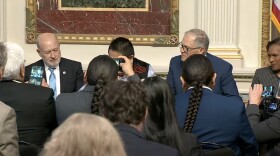-
In a few weeks, relay teams will race from the snowy hills of Mount Baker Ski Area to the salty waters of Bellingham Bay. But organizers have to really watch the snow.
-
Scientists are studying odd, pickle-shaped sea creatures they found off the coasts of Oregon and Washington. They’re known as pyrosomes.
-
Oregon State University is using science to block even a smudge of wildfire flavors in prime Northwest wines
-
After decades of fighting to protect salmon and steelhead, Northwest tribal leaders signed a historic agreement with state and federal officials – the Columbia Basin Restoration Initiative.
-
A new study has found – when it comes to climate change – Washington’s Tri-Cities is facing the opposite situation as many large cities.
-
A controversial wind farm that was set to be the largest in Washington has been slashed nearly in half. The project developer said the new restrictions could be bad for renewable energy development around the state.
-
A large algal bloom on the Snake River officially has died off. The toxic algae stretched about 30 miles along the river this past fall.
-
Pollution and greenhouse gas emissions from the manufacture of fast fashion are growing just as fast as the industry. A new bill in Washington aims to help lessen the industry’s pollution.
-
One tree in Central Oregon has helped protect iconic whitebark pine trees across the West. Scientists have sequenced the threatened tree’s genome, which helps plant more resilient trees faster.
-
New research shows stronger heat domes could happen more often as the climate changes.










